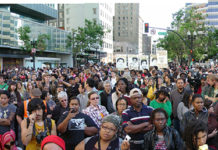Pack the courtroom Friday, May 20, 9 a.m., 1225 Fallon St., Oakland, for their pre-trial hearing; demand charges be dropped
by The People’s Minister of Information JR Valrey
The Land Action 4 are four people who were arrested after actively reclaiming neglected property. I was made aware of this case by my comrade, housing activist Tim Killings, who organizes around housing rights in Oakland. I conversed with one of the members of the Land Action 4, Patrick Xu, about their case, their beliefs, human rights and the history of reclaiming property internationally. Check out Patrick Xu in his own words, and support the dropping of charges for the Land Action 4.
M.O.I. JR: Can you talk a little bit about the non-profit that you work with, Land Action? What is the purpose of the organization?

Patrick Xu: Land Action was formed in 2011 in order to teach social and ecological justice activists how to occupy, improve and repurpose abandoned property, including houses and vacant lots.
M.O.I. JR: A crew of y’all, known as The Land Action 4, are facing seven criminal charges, three felonies, eight and a half years in prison and an $89,000 fine for what? What is the story behind this case?
Patrick Xu: My housemate and I were occupying a property well known to be abandoned, using the same methods and tactics that have been used hundreds of times before in Oakland. Initially we were occupying as property managers for the non-profit Land Action.
We had done our best to contact the owner and had received no reply. It was never our intention to deprive a lawful owner of their property, which is why we had tried our best to contact the owner of record. We were trying to invoke adverse possession in order to intercept an abandoned property before it went to tax auction.
Long story short, the owner of record turned up and discovered our occupation after we had been living there for three whole months – I parked my car in the driveway every day, my housemate and I made repairs to the exterior of the building, we came and went freely and talked to neighbors, several of whom had been frustrated by the owner of record’s absence and negligence. So I think the fact that we lived there openly for a quarter of a year before the owner even noticed demonstrates that the owner was significantly disengaged with the property.
At that point, the owner of record was instructed by police officers to file an unlawful detainer against us, which is a civil motion. But because her niece works in the Alameda County District Attorney’s Office, she was able to get the DA to intercede on her behalf and skip the established procedure which was in place for good reason.
After we had successfully negotiated with the DA and agreed to leave, the DA issued warrants for our arrest the day before I was scheduled to be out of the property, which indicates to me that they weren’t just interested in getting the lady her house back. But it seems the DA wasn’t just interested in helping out a friend of the office, so to speak.
Land Action was formed in 2011 in order to teach social and ecological justice activists how to occupy, improve and repurpose abandoned property, including houses and vacant lots.
They wanted to prosecute me and my housemate, and through us get to Steven DeCaprio, who is highly outspoken about his housing activism over the past decade, in order to shut him down and sink his organization, Land Action. They’re targeting him because he speaks openly about his activism, he has an audience, and he and his collaborators have been highly effective at opposing the giveaway of our public resources to profiteering developers, especially tax-abandoned property.
M.O.I. JR: Should housing be a human right? Why?
Patrick Xu: YES. Because in Oakland, for every person sleeping on the street, or in their car, or under a bridge, there are 6.2 vacant housing units, not for sale and not for rent. Nationally, the numbers are even worse: For every chronically homeless person in the U.S., there are 46.2 vacant housing units, not for sale and not for rent. So there is no such thing as a housing shortage. The real problem is a grossly skewed distribution of wealth.
The reason why all those houses are kept empty, and why homeless encampments are routinely razed, is to make an example of some proportion of the population. The ruling class keeps them desperate and poor and dispossessed in order to discipline the rest of us into accepting the conditions of wage labor, so that we will be grateful to spend our entire lives as renters.
In Oakland, for every person sleeping on the street, or in their car, or under a bridge, there are 6.2 vacant housing units, not for sale and not for rent. So there is no such thing as a housing shortage.
So homelessness is a problem that has been entirely created by the ruling class in order to extract labor from people. Homelessness is not natural; in fact it requires constant, active maintenance to keep people homeless. If no one showed up to sweep away homeless encampments, then all those people would stay put and live where they liked.
M.O.I. JR: Can you give the people a little history of squatter movements locally or around the world that have been successful in acquiring land and/or shelter?
Patrick Xu: Squatting has been and is still practiced all over the world. I hear that squatting and squatter communities are particularly strong in Europe. Some of the Bay Area’s most well known squats in recent years were Hellarity House, the RCA/Hot Mess and the Stay Away. Squatting has also been widely practiced in New York City.
My friend recently introduced me to a book called “Housing: an Anarchist Approach” by historian Colin Ward, and in it there is a thorough overview of the post-World War II squatters’ movement in Britain. The scale of that movement is pretty incredible.
One wave of squatting immediately following the war targeted unused army and air force camps, with 40,000 people occupying just over a thousand camps. By the mid-‘70s, when Ward published the book, he says: “The squatter’s movement has moved from being a protest to being one of the normal modes of tenure in London and many other cities …
“It is estimated that there are from 20,000 to 25,000 squatters in London and about 10,000 in the other British cities. There may be many more, since not everyone wants to advertise the fact that he is an unauthorized occupier.”
Squatting has been and is still practiced all over the world.
Another inspiring example is the Movimento dos Trabalhadores Sem Terra (MST) in Brazil, which in English translates to “Landless Workers’ Movement.” According to their website, “The MST has won land titles for more than 350,000 families in 2,000 settlements as a result of MST actions, and 180,000 encamped families currently await government recognition.”
Because of Brazil’s colonial history and capitalist policies, land ownership in Brazil is concentrated into the hands of a few at the expense of the many. According to the MST website, in Brazil, just 3 percent of the population owns two thirds of all arable land. Incidentally, in the U.S., 1 percent of the population owns all arable land, according to the Census Bureau.
Due to political turmoil in Brazil, much of that land was remaining unproductive and unused, while there was a burgeoning population of dispossessed rural workers who were struggling to survive. The MST organized groups of settlers to occupy those lands and make them productive again based on the traditional village model, thereby providing a decent livelihood for the workers and also producing agricultural products for the entire society. Of course the government pushed back against the MST with bloody and brutal repression, but the sheer massiveness of the movement eventually forced the government to grant the movement official recognition.
M.O.I. JR: What do we want people to learn from this case?
Patrick Xu: The extreme wealth inequality we see today isn’t natural. It requires constant maintenance – by police repression, by the giveaway of our public resources to corporate interests, by legions of crooked lawyers.
Government on all levels routinely breaks the law in order to ensure the rich stay rich and the poor stay poor. While we are helpless to do much about corruption at the state and national levels, at least we can visit the offices of the people running local government.
Many of the concrete acts of class war play out on the local level, parcel by parcel, block by block. Stemming the tide of bullshit flooding our city is part of the revolutionary work we must do.
So let’s send local government a strong message: “We know what you’re up to. We are an intelligent and discerning public, and we can see that you have allied yourselves with capital interests over the public good. You need to pick the right side of this fight.”
M.O.I. JR: Where can people get more information?
Patrick Xu: Land Action is helping with the legal defense of three tax-abandoned vacant lots in West Oakland. Come to one of our garden parties, where you can learn more about this little known public resource and how to legally occupy and transform tax-abandoned property into low-cost housing and green space. Check out land-action.org or the Land Action Facebook page to find out about our garden work days.
M.O.I. JR: How could people directly support you?
Patrick Xu: We really need people to attend our first hearing on Friday, May 20, 9 a.m., at the Rene C. Davidson Courthouse, Dept. 10, at 1225 Fallon St., Oakland, where our lawyers will present our motion to dismiss. We need to show the DA and the courts that the public is paying attention and intends to hold them accountable for the shady dealings underlying this case.
The People’s Minister of Information JR Valrey is associate editor of the Bay View, author of “Block Reportin’” and “Unfinished Business: Block Reportin’ 2” and filmmaker of “Operation Small Axe” and “Block Reportin’ 101,” available, along with many more interviews, at www.blockreportradio.com. He can be reached at blockreportradio@gmail.com.

 Store
Store







